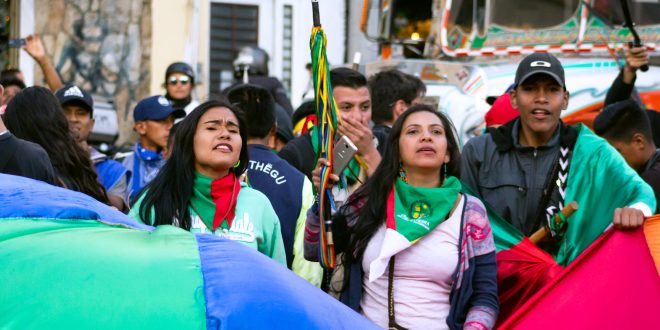Podcast: Play in new window | Download (Duration: 59:00 — 42.9MB)
 Throughout 2019, an unprecedented amount of massive protests, marches, and strikes occurred in various countries throughout Latin America and the Caribbean, all commonly giving voice to the sharp inequality throughout these societies that has been produced by the increasing austerity of economic policy modeled on neoliberalism.
Throughout 2019, an unprecedented amount of massive protests, marches, and strikes occurred in various countries throughout Latin America and the Caribbean, all commonly giving voice to the sharp inequality throughout these societies that has been produced by the increasing austerity of economic policy modeled on neoliberalism.
While similar to these examples, Colombia nevertheless offers a unique case, being the country with the highest inequality in terms of land distribution in all of Latin America and having the largest internal population displacement in the world. (Oxfam)
This has largely been an effect of the armed conflict in Colombia that has lasted for over five decades between the Colombian government and the FARC (the Revolutionary Armed Forces of Colombia). On top of claiming over 220,000 lives, the armed conflict has also resulted in the intense militarization of the government and the frequent repression of social groups and organizations fighting for alternative forms of Colombian citizenship.
The U.S. has played a heavy role in aiding the Colombian government in a deadly War on Drugs through financial and policy assistance, most notably with the implementation of Plan Colombia from the early 2000s.

In 2016, the Colombian government and the FARC signed an historic peace agreement which called for a ceasefire and the laying down of arms among other things. But the Colombian government has been slow and largely ineffective in implementing the policies laid out in the peace agreement and in many instances has continued to deepen social, economic, and political inequality for many Colombian citizens.
The Colombian National Strike, which began 21 November 2019, comes in this context, originating as a response to a set of tax reforms proposed by the current Colombian President Iván Duque, and expanding to include a wide range of demands by a vast coalition of Colombian citizens.
In today’s Interchange we’ll offer a particular angle from which to view the National Strike, the Peace Accords, and Plan Colombia: that of the Cocalera, particularly the women who work in the coca fields in places like Putumayo.
 GUEST
GUEST
Margarita Martinez-Osorio, co-author of “Voices from the Coca Fields,” a 2018 report issued by the Colombian social justice and human rights organization Dejusticia. The report focuses on the socioeconomic situations of women coca growers in Putumayo faced with a triple burden of care, community, and productive labor, all while navigating the stigma of criminality given them by the Colombian state due to their association with an illicit crop. Martinez-Osorio is a PhD student in the History department at Indiana University where she is researching the Peasant Movement in Colombia in the 1960s.
RELATED
Voices from the Coca Fields: Women building rural communities (Executive Summary)
“The Debts We Owe to Female Coca Growers” by Margarita Martinez-Osorio
Dejusticia presents on precautionary principle to the Constitutional Court in case of illicit crops fumigation with glyphosate
Outrage after Colombia riot police force young woman into unmarked car
ESMAD: Is Colombia’s loathed anti-riot police unit on the way out?
¡Chile despertó! – Chile Woke Up! (Interchange)
MUSIC – Selections by Margarita Martinez-Osorio
“Se Van Van Van” by La Batucada Guaricha
“De esto te hablamos” by Various Artists
“Colombia Tierra Querida” performed by Matilde Díaz with Lucho Bermúdez and his Orquesta
“Somos Artistas, No Terroristas” by Mónica Rocha
“Para la Guerra, Nada” by Marta Gomez
CREDITS
Producer & Host: Doug Storm
Episode Producer: Cole Nelson
Mixed and Edited by Doug Storm
Executive Producer: Kade Young
 WFHB Bloomington Community Radio
WFHB Bloomington Community Radio


